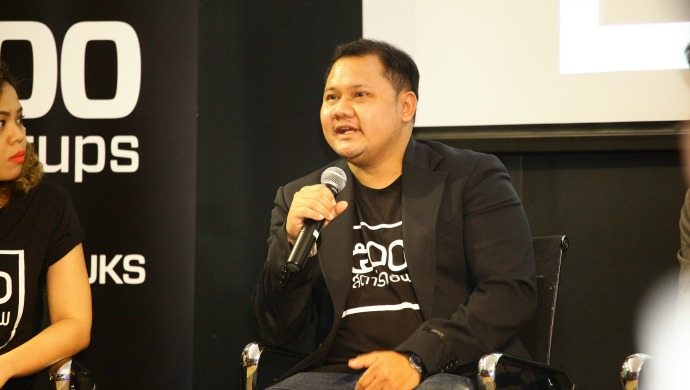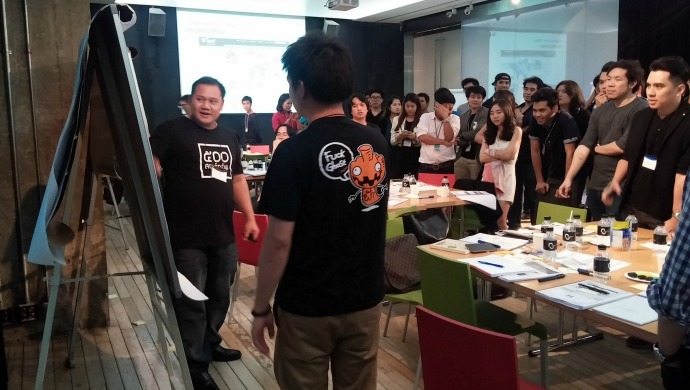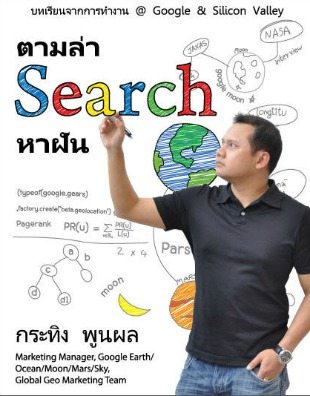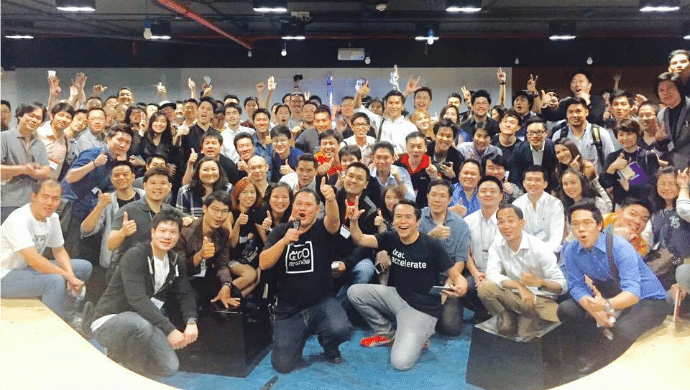“I don’t know when we will produce the first Unicorn startup, but I am quite certain we will see half unicorns to come out within five years”

Krating Poonpol
When I Skyped Krating Poonpol, he was attending to his ailing father at a hospital in Thailand. When I began to offer my apologies for giving him a call at an inopportune time, he smiled and asked me to go ahead with my questions, because Krating is so committed to the growth of entrepreneurship in Thailand and that he wanted the world to know what is happening in this Southeast Asian country’s fledgling startup industry.
Krating is perhaps the most active and most important figure in the Thailand startup ecosystem. He has many achievements to his credit: It was he who started Disrupt, the number one startup education programme in Thailand, in 2012.
He is also Founder of dtac Accelerate, the most popular startup programme in the country. It was Krating who brought the Founder Institute to the country. And in the latest gig, he is the Manager of 500 TukTuks, the most active VC fund in Thailand.
In a freewheeling chat with e27, he talks about startups, funding, talent, market and opportunities in Thailand.
Hare are the edited excerpts:
Let me begin with this: Southeast Asia has seen a lot of startup activity of late, but Thailand’s absence has been conspicuous. Why?
Actually speaking, there have been a lot of activities happening in Thailand. We must keep in mind that the Thai startup ecosystem was started only in 2012, so we are just a 4-year-old ecosystem. But we are growing rapidly.
In 2012, only three startups received funding, but now in the first half of 2016 alone, the number jumped to 71 or 29x, speaks volumes about the growth.
Additionally, total amount of funding increased from less than US$5 million in 2012 to US$100 million in the first half of 2016 alone. In 2012, the largest round of funding was US$2 million but now it’s US$15 million. The number of startups also increased by 8X to 2,000-plus in 2015. Every single day, we receive 10-plus pitches and the quality of the startups are getting much better.
While most of the activity were in seed stage, within two years — when these startups move to Series A and B and when we get the large exits — it will be another turning point.
But still, despite a favourable environment, Thailand has not seen large investments yet…
Again, it is because we have just started. Most of the companies you see now started just last year. So, they are still in seed stage. We have only a few companies that got started in 2013 and 2014. But if you take into account the amount of funding and size of the round, it is growing rapidly and healthily.
We will see the largest funding round happening in the history of Thailand funding round very soon, though it will still be small compared to Singapore and Indonesia.
The other things you need to consider is that some Thai companies, once they received term sheet for Series A or B, are required to move to Singapore and register a holding company due to more investor-friendliness, long-term tax consideration and other things. And then it becomes a Singapore company, not a Thai company anymore, though the majority of their team and operation are still back in Thailand.
Thailand has one of the largest smartphone populations in SEA. How do startups leverage this potential? What are the other key opportunities in the country?

Thailand offers a lot of things: one, it has large mobile penetration and smartphone penetration is growing rapidly. I believe it is more than 60 per cent now and will be 70-80 per cent soon. Of this, 66 per cent are mobile Internet users and it is growing rapidly.
It is clearly a mobile-first country and when you think that Thailand is the second largest economy in Southeast Asia, it is a significant local market to build startups from.
Also, Thailand is big in social: 30 million-plus people are using Line and Facebook and more than 50 per cent of total B2C e-commerce is social commerce (it involves selling products via Facebook page/Instagram, chatting with customers via Line/Facebook Messenger, banks transferring the money, then shipping the product) and I don’t see this number slow down anytime soon.
For e-commerce alone, there is a lot of friction waiting to be solved. While e-commerce is growing rapidly, it is still a tiny fraction total retail sales in Thailand. So on the one hand, you have a sizeable local market yet most of the sectors are inefficient and sometimes outdated, while on the other hand, you don’t have enough startups to solve these problems and modernise these sectors.
There are opportunities in almost all verticals. For example edtech. Of the 23 companies we have invested so far, we could find only one edtech startup SkillLane. The Thai education market, if you count it from pre-school until professional, life-long education is five times larger than telco but there is only one company that we can invest in.
Also, Thailand is a really big tourist destination; 13 per cent of our GDP is tourism yet we can only invest in one traveltech startup so far.
The other area is agritech. We have zero agritech investment yet. Agriculture is also a very large and inefficient industry in Thailand with Thai farm productivity among the lowest. There are a lot to do, not just in terms of increasing productivity and yields, but also in terms of disrupting the entire value chain.
Also Read: Cashback sites are all the rage but not in Thailand; this startup aims to fill the gap
Property tech is another space. It is close to a US$10 billion industry in Thailand and we have made zero investment in this space, where in Malaysia it is worth U$500 million. Thailand is also the top country for automotives in Southeast Asia and our local sales in almost one million cars a year. Yet, we have only a few players in this area like One2Car which got acquired by iCar for only US$15 million.
To sum it up, I think Thailand is a sizeable mobile-first, big in social and represents sizeable online market with many relatively white space for startups to disrupt with few competitions.
Although tourism is major contributor to your GDP, there are not many startups disrupting this industry. Why?
You can say Agoda, the first generation Thai tech startup, is quite big now. They were acquired by Priceline in 2007 and their headquarters is still in Thailand.
FavStay is doing great as far as I know, but it was just started in 2015. Now they have listings in Thailand almost equal to AirBnB and will surpass it in a few months, so I think it is quite impressive though not much is covered publicly.
The other problem for tourism in Thailand is that it is very fragmented and quite local, so it will take a longer time to build since the market structure is difficult to disrupt. You also need a lot of on-ground market education which will take time but once you reach a tipping point, it will be massive.
Singapore and Indonesia have already produced Unicorn startups. When do you think Thailand can give birth for its first Unicorn and in which sector?
That’s what we hope to come from our portfolio company too (laughing). I don’t know when we will produce the first billion dollar company, but I am quite certain we will see the half unicorn ( US$500M-plus) to come out within five years. I believe it will be in content/communication, games, fintech, e-commerce/marketplace/logistics. I am also very positive about travel/tourism.
Fintech is on the rise this year in Thailand. We have already invested in four such companies this year and plan to do many more. We are also quite positive about the role of the Bank of Thailand and the recently formed Thai FinTech Association and SEC to support in terms of spearheading the required regulatory framework as well as providing incentive to promote fintech in Thailand.
Not to mention the role of the large banks in Thailand such as KBank, Krungsri, and SCB. They are putting serious support, in terms of both money and commitment into the ecosystem. There is also the general scheme by the government to promote startups — US$600 million will be poured in to support the ecosystem.
Can you name some startups that are on their way to becoming Unicorns?
There are many companies in our portfolio that are growing by leaps and bounds, some even 20 per cent week on week. I am sure there are many more outside of our network as well. In our portfolio: Omise, Claim Di, Skootar, Fastwork, Finnomena, Ginja, Wishbeer, and OneStockHome are growing very fast and strong. And out side of portfolio, I heard FavStay is doing great.
You (500 Startups) have made 20 investments yet and are announcing three more. Can you share their names?
Not yet, but they will be super awesome companies. We will definitely share with you guys first once we are ready. They are in e-commerce, and travel.
How do you compare the Thai startup ecosystem with that of India, Indonesia, Malaysia or Singapore? What is lacking in Thailand?
In terms of stage of development, I think Thai startup ecosystem is like Indonesia three years ago before things started exploding. I see Thailand follow the same trajectory in the next couple years. But I think Thailand will be relatively easier to crack than Indonesia. In terms of risk-reward. I would always consider Thailand, which is the second largest economy in SEA. Also it is not too heated with lots of white space for you to play.
Indonesia is definitely a huge market but it is like more than 10 small countries which are very difficult to crack and scale, although many companies are running successfully, and it is a huge competitive advantage. In terms of similarity, I think we are more similar to Malaysia than India and Singapore or even Indonesia. In term of the support from the government, I hope Thai government will follow the best practice and learnings from Singapore, they have tried many things and many things seems to work pretty well.
In terms of similarity, I think we are more similar to Malaysia than India and Singapore or even Indonesia. In term of the support from the government, I hope Thai government will follow the best practice and learnings from Singapore, they have tried many things and many things seems to work pretty well.
In terms of weaknesses, we are seriously lacking tech talent. Almost hundred per cent of the startups I talked to are in need of CTO/tech lead. We also lack growth marketer and digital talents but in a less serious manner than tech talent.
Our regulatory framework/government process also needs to be revamped. We don’t have a regulatory framework to support ESOP for private companies, convertible note and also tax, talent mobility visa, or even company registration and incorporation, and many others. However, the government is taking this seriously and we hope it will become a reality soon.
We also lack in terms of participation from big corporates. It is also still very rare to find Thai conglomerate to acquire startup even at small exit, but we start to see it improve. For example, the Central Group’s acquisition of Zalora is a good sign. We also started to see many big corporations not only in banking sectors are trying to partner and work with startups.
Exit. I don’t think we have exit mechanism in Thailand for tech startup yet. I think if we have a separate stock exchange for tech startup companies like what is proposed by Vietnamese government, it would provide a lot of liquidity to the ecosystem which can be recycled into the ecosystem and help fuel growth.
Is Series A and later-stage funding a challenge in Thailand? How has the global pessimistic funding environment affected Thai startups?
Definitely. We have only a few series A investors here like InVent and no series B investor. All series B investor for Thai startups are Japanese investors or others.
A weak funding environment doesn’t actually impact our ecosystem much at the moment. I think that we see more money pouring into SEA and Thailand. This money is shifted from somewhere else since SEA and Thailand represents better opportunity and lower valuation and more upside potential given the same money.
What are the contributions of corporates and the government to promote the ecosystem?
Big banks are pouring serious commitment and money to support the fintech ecosystem — whether it is VC, accelerator, partnership support and APIs. Kbank, Krungsri and SCB are leading the pack and others will surely follow suit.
KBank has launched KBTG with well over US$150 million budget, Krungsri launched its accelerator and SCB has its Digital Venture and US$50 million fintech VC fund as well as accelerator programme.
Central just acquired Zalora. Many corporates, if not all, that we are talking to are super keen on working with startups and provide support since the government is championing startup as one of the key pillars of its Thailand 4.0 strategy. All the telcos have been supporting startups for several years — dtac has its dtac Accelerate which is no.1 accelerator in Thailand now and it provides funding and mentorship and marketing support to 10 startups/batches and now already on batch 4. AIS has its successful AIS The Startup partnership programme to help startup scale.
All the telcos have been supporting startups for several years — dtac has its dtac Accelerate which is the no.1 accelerator in Thailand now and it provides funding and mentorship and marketing support to 10 startups/batches and it is now already on batch 4. AIS has its successful AIS The Startup partnership programme to help startups scale.
The government has just launched a highly successful Startup Thailand Conference and they are putting in around US$600 million to support startups via several mechanisms – startup vouchers, investment, etc. Though a significant part of that support will be poured into SMEs but several hundred million dollars will be put into promoting startups in Thailand.
Bank of Thailand and other government agencies are also throwing support for startups. It is a very very dynamic scene here in Thailand which is very good for our ecosystem. This is unprecedented.
I understand that e-commerce, fintech, logistics are the three key sectors in Thailand. What about new-age tech like VR, AR, IoT?
I think similar to other emerging ecosystems, we are focussing on something relatively fundamental that did not exist earlier and modernise the outdated inefficient sectors which provide huge upside potential first. After all, all these foundations like e-commerce, fintech, logistics are built, I am sure there will be startups attacking these spaces.
However, some Thai companies located in Silicon Valley like AdsOptimal are already attacking VR adstech space and started to see a few I say frontier tech like AR/VR and IoT in Thailand but they are still small and very early stage.

Actually, there are at least 3 to 4 quite cool AR/VR companies in Thailand in Bangkok and Khon Kaen but they focus mostly on providing customised solutions to corporations at the moment. We are also starting to see an IoT ecosystem emerging from Chiang Mai. It is growing organically and healthily.
Why is social commerce still a major trend there? When can we expect people to use Internet banking, etc?
It is because Thais are big in social, we spend 4-5 hours a day on Line, Facebook, Instagram, etc. and I would argue that more than 90 per cent of mobile Internet users ( if not 100 per cent) in Thailand are social networking/chat users, you can say we are socially addictive so online social is a big part of our daily living.
In fact, Bangkok is one of the top capital of Facebook, Siam Paragon is one of the top shopping malls in Bangkok, and Suvannabhum airport is the top Instagrammed place in the world in 2013, though it now drop to number 4 in the world in 2014. But think about it, a shopping mall and airport in Bangkok are top 5 most Instagram places in the world.
Office workers use Line rather than Slack etc. in their work communication as a normal practice and you communicate with your customers via Line all the times, so these social-orientation drives social commerce in Thailand. You fish where the fish are and all the fish in Bangkok are on Line, Facebook, Instagram.
Some merchants sold more than US$3 million a year on Facebook alone and there are many of them. Like JQPUUMANUNG, they sold close to US$10 million boiled crab deliveries on Facebook, lots of people built several million dollars beauty and fashion business from scratch via Facebook and Instagram.
Now people still use bank transfer, they transfer money via online banking and then send transfer receipt via Line to the merchant then the merchant will deliver product and again, using Line to communicate to customers about the delivery tracking number. It is pretty common for social commerce here in Thailand but I think people will gradually move to secured online payment channels, not bank transfer, and there will be fewer steps and less friction over time. It will take time to change behaviour.
The post Thailand startup ecosystem is 3 years behind Indonesia: Krating Poonpol of 500 TukTuks appeared first on e27.